Solent University: Unilever's Marketing, Sales & Negotiation Skills
VerifiedAdded on 2023/06/18
|13
|2513
|310
Report
AI Summary
This report provides a comprehensive analysis of Unilever's marketing, sales, and negotiation skills. It begins with a PESTEL and SWOT analysis to assess Unilever's external and internal environments. The report then discusses Unilever's marketing mix, evaluating the effectiveness of their product, price, place, promotion, people, process, and physical evidence strategies. Furthermore, it highlights the sales and negotiation skills applied by Unilever, drawing conclusions and offering recommendations for improvement in their marketing tactics, including strategies for product focus, pricing, promotion, distribution, employee retention, process optimization, and enhancing physical presence. This report is valuable for understanding the practical application of marketing, sales, and negotiation concepts in a global organization like Unilever.
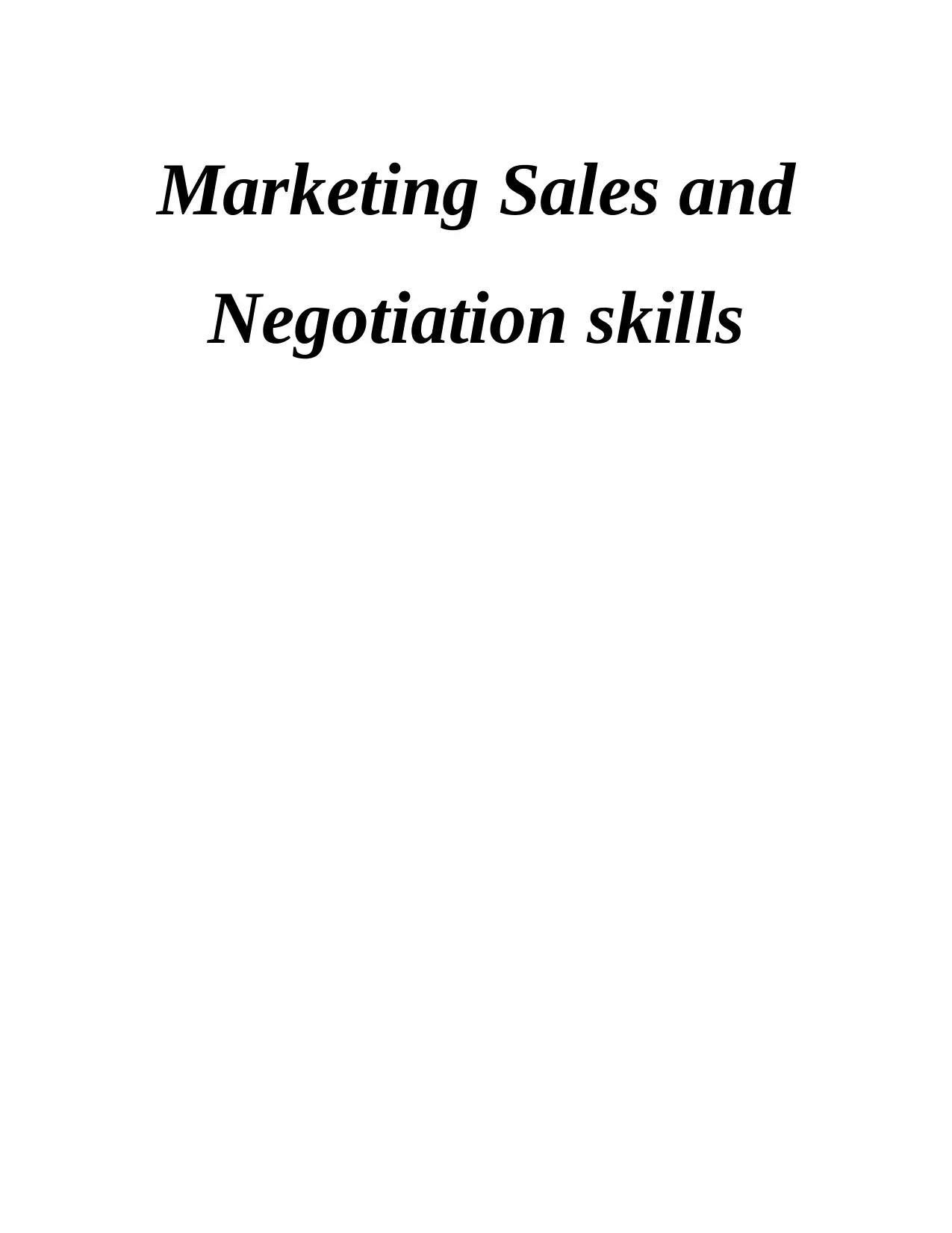
Marketing Sales and
Negotiation skills
Negotiation skills
Paraphrase This Document
Need a fresh take? Get an instant paraphrase of this document with our AI Paraphraser
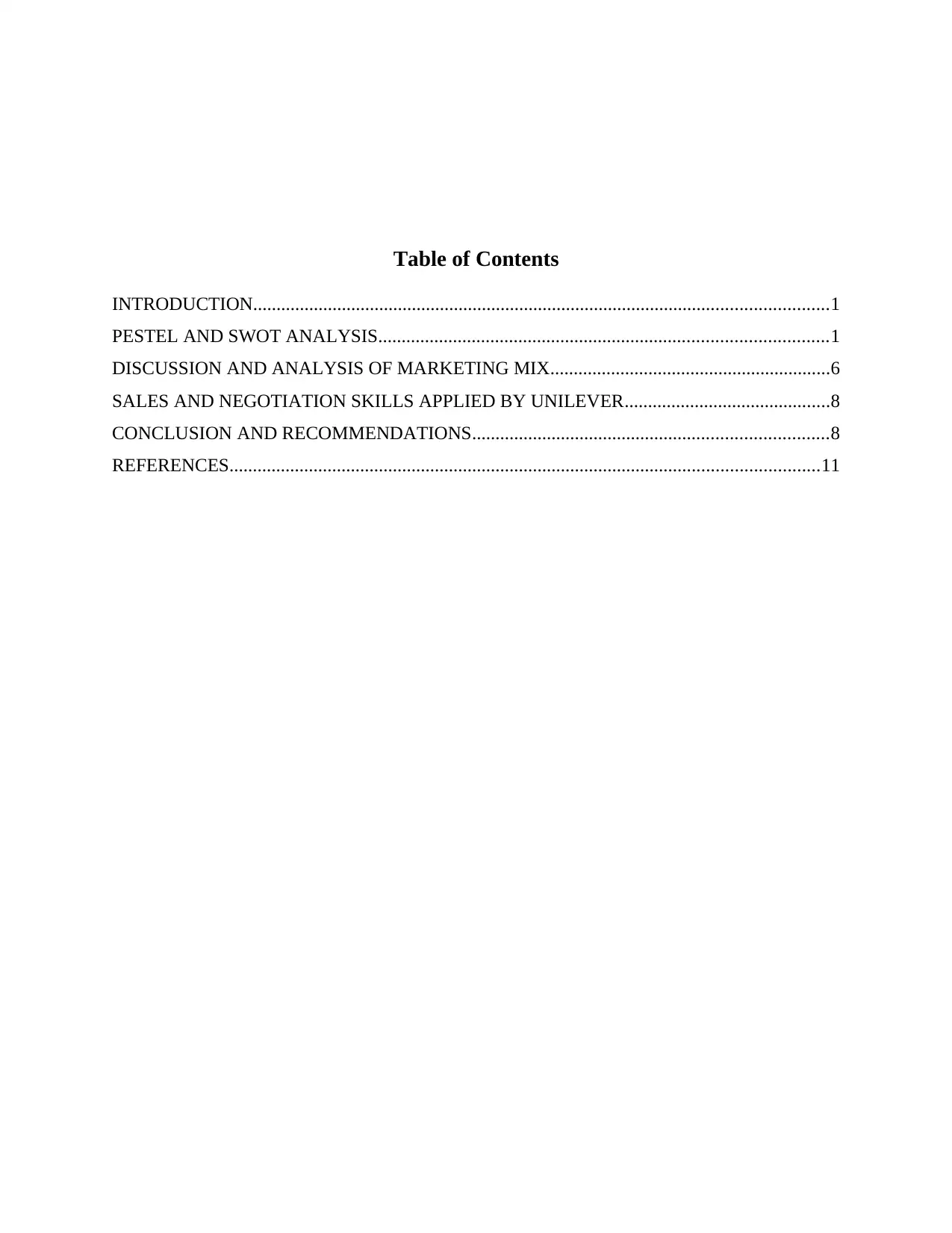
Table of Contents
INTRODUCTION...........................................................................................................................1
PESTEL AND SWOT ANALYSIS................................................................................................1
DISCUSSION AND ANALYSIS OF MARKETING MIX............................................................6
SALES AND NEGOTIATION SKILLS APPLIED BY UNILEVER............................................8
CONCLUSION AND RECOMMENDATIONS............................................................................8
REFERENCES..............................................................................................................................11
INTRODUCTION...........................................................................................................................1
PESTEL AND SWOT ANALYSIS................................................................................................1
DISCUSSION AND ANALYSIS OF MARKETING MIX............................................................6
SALES AND NEGOTIATION SKILLS APPLIED BY UNILEVER............................................8
CONCLUSION AND RECOMMENDATIONS............................................................................8
REFERENCES..............................................................................................................................11
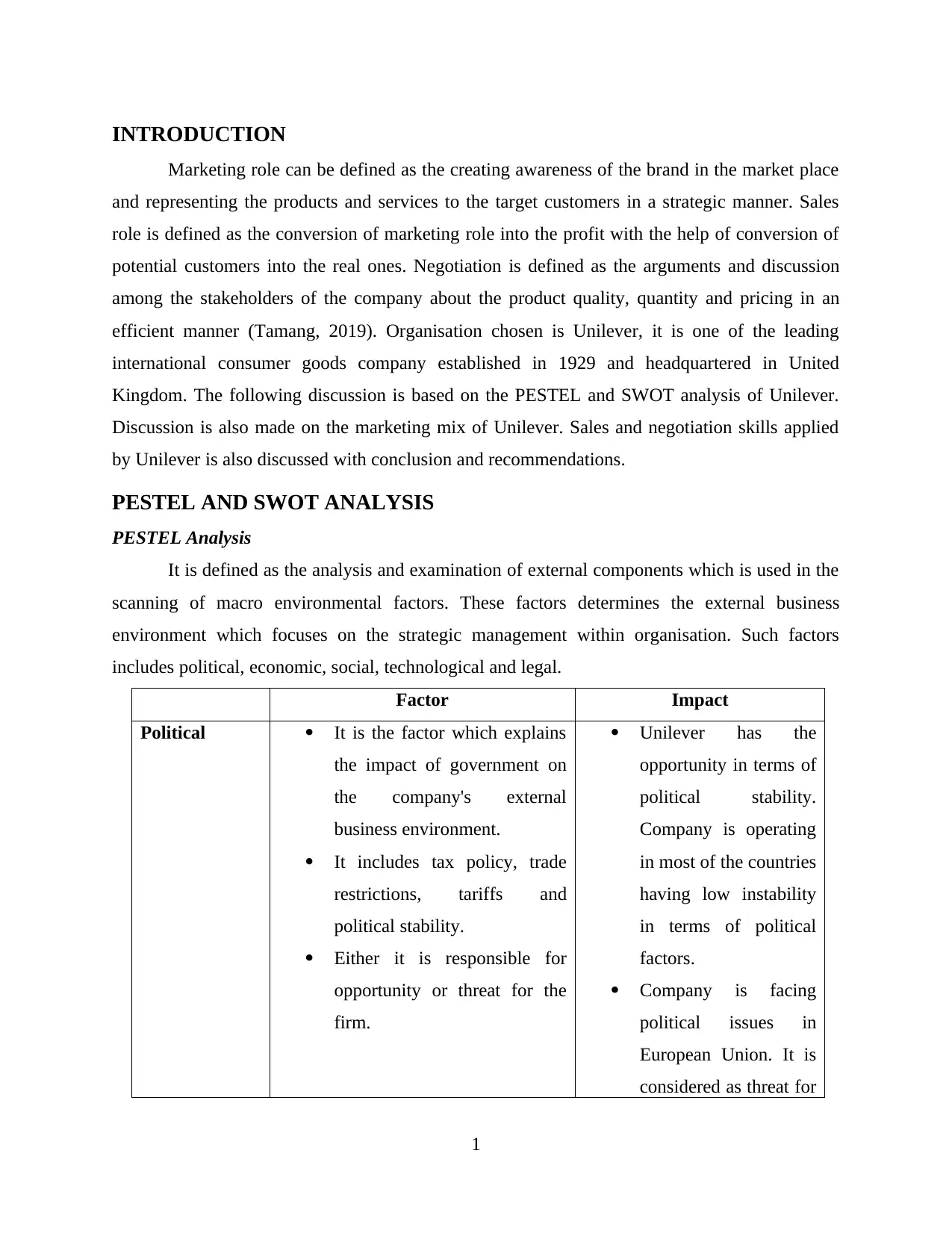
INTRODUCTION
Marketing role can be defined as the creating awareness of the brand in the market place
and representing the products and services to the target customers in a strategic manner. Sales
role is defined as the conversion of marketing role into the profit with the help of conversion of
potential customers into the real ones. Negotiation is defined as the arguments and discussion
among the stakeholders of the company about the product quality, quantity and pricing in an
efficient manner (Tamang, 2019). Organisation chosen is Unilever, it is one of the leading
international consumer goods company established in 1929 and headquartered in United
Kingdom. The following discussion is based on the PESTEL and SWOT analysis of Unilever.
Discussion is also made on the marketing mix of Unilever. Sales and negotiation skills applied
by Unilever is also discussed with conclusion and recommendations.
PESTEL AND SWOT ANALYSIS
PESTEL Analysis
It is defined as the analysis and examination of external components which is used in the
scanning of macro environmental factors. These factors determines the external business
environment which focuses on the strategic management within organisation. Such factors
includes political, economic, social, technological and legal.
Factor Impact
Political It is the factor which explains
the impact of government on
the company's external
business environment.
It includes tax policy, trade
restrictions, tariffs and
political stability.
Either it is responsible for
opportunity or threat for the
firm.
Unilever has the
opportunity in terms of
political stability.
Company is operating
in most of the countries
having low instability
in terms of political
factors.
Company is facing
political issues in
European Union. It is
considered as threat for
1
Marketing role can be defined as the creating awareness of the brand in the market place
and representing the products and services to the target customers in a strategic manner. Sales
role is defined as the conversion of marketing role into the profit with the help of conversion of
potential customers into the real ones. Negotiation is defined as the arguments and discussion
among the stakeholders of the company about the product quality, quantity and pricing in an
efficient manner (Tamang, 2019). Organisation chosen is Unilever, it is one of the leading
international consumer goods company established in 1929 and headquartered in United
Kingdom. The following discussion is based on the PESTEL and SWOT analysis of Unilever.
Discussion is also made on the marketing mix of Unilever. Sales and negotiation skills applied
by Unilever is also discussed with conclusion and recommendations.
PESTEL AND SWOT ANALYSIS
PESTEL Analysis
It is defined as the analysis and examination of external components which is used in the
scanning of macro environmental factors. These factors determines the external business
environment which focuses on the strategic management within organisation. Such factors
includes political, economic, social, technological and legal.
Factor Impact
Political It is the factor which explains
the impact of government on
the company's external
business environment.
It includes tax policy, trade
restrictions, tariffs and
political stability.
Either it is responsible for
opportunity or threat for the
firm.
Unilever has the
opportunity in terms of
political stability.
Company is operating
in most of the countries
having low instability
in terms of political
factors.
Company is facing
political issues in
European Union. It is
considered as threat for
1
⊘ This is a preview!⊘
Do you want full access?
Subscribe today to unlock all pages.

Trusted by 1+ million students worldwide
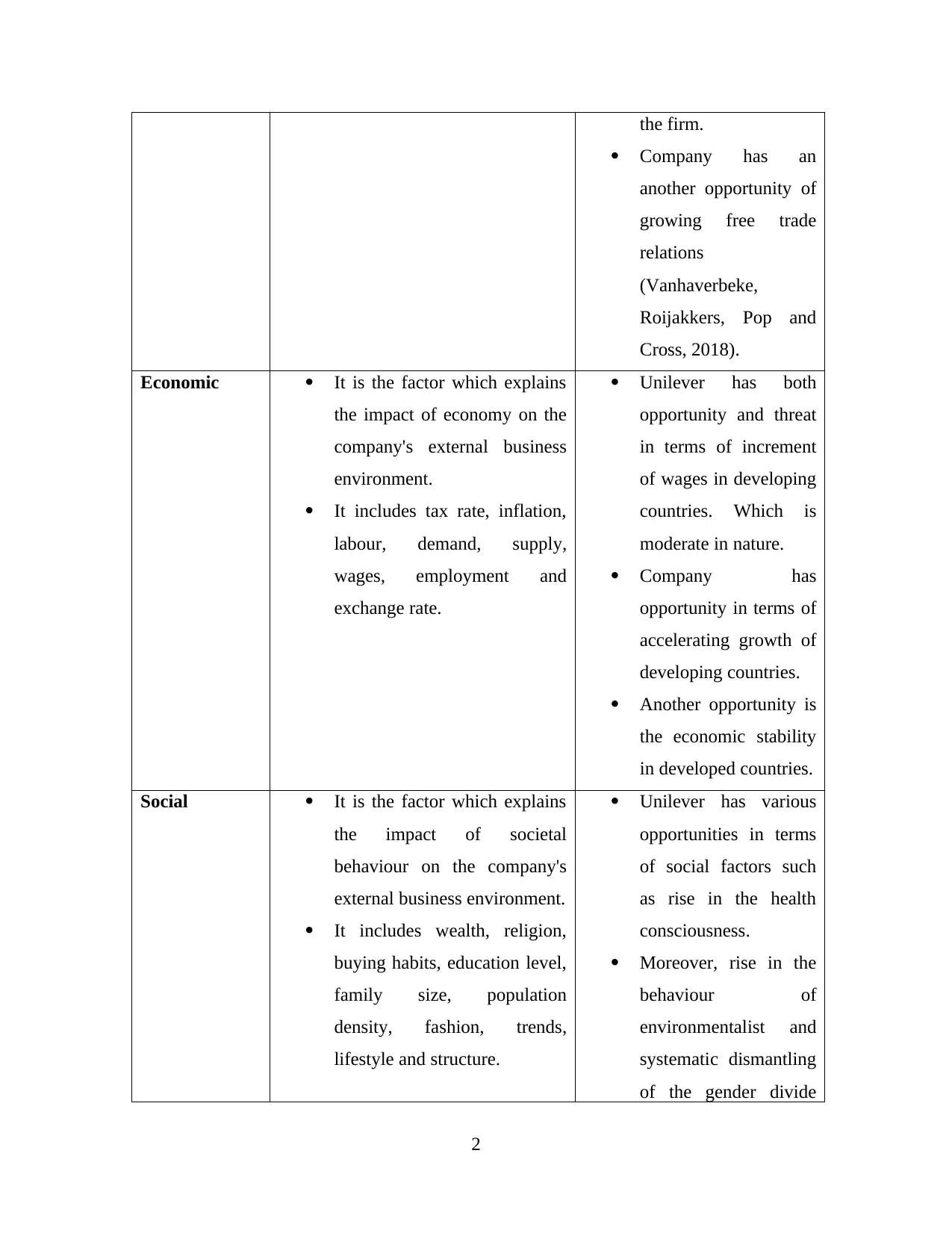
the firm.
Company has an
another opportunity of
growing free trade
relations
(Vanhaverbeke,
Roijakkers, Pop and
Cross, 2018).
Economic It is the factor which explains
the impact of economy on the
company's external business
environment.
It includes tax rate, inflation,
labour, demand, supply,
wages, employment and
exchange rate.
Unilever has both
opportunity and threat
in terms of increment
of wages in developing
countries. Which is
moderate in nature.
Company has
opportunity in terms of
accelerating growth of
developing countries.
Another opportunity is
the economic stability
in developed countries.
Social It is the factor which explains
the impact of societal
behaviour on the company's
external business environment.
It includes wealth, religion,
buying habits, education level,
family size, population
density, fashion, trends,
lifestyle and structure.
Unilever has various
opportunities in terms
of social factors such
as rise in the health
consciousness.
Moreover, rise in the
behaviour of
environmentalist and
systematic dismantling
of the gender divide
2
Company has an
another opportunity of
growing free trade
relations
(Vanhaverbeke,
Roijakkers, Pop and
Cross, 2018).
Economic It is the factor which explains
the impact of economy on the
company's external business
environment.
It includes tax rate, inflation,
labour, demand, supply,
wages, employment and
exchange rate.
Unilever has both
opportunity and threat
in terms of increment
of wages in developing
countries. Which is
moderate in nature.
Company has
opportunity in terms of
accelerating growth of
developing countries.
Another opportunity is
the economic stability
in developed countries.
Social It is the factor which explains
the impact of societal
behaviour on the company's
external business environment.
It includes wealth, religion,
buying habits, education level,
family size, population
density, fashion, trends,
lifestyle and structure.
Unilever has various
opportunities in terms
of social factors such
as rise in the health
consciousness.
Moreover, rise in the
behaviour of
environmentalist and
systematic dismantling
of the gender divide
2
Paraphrase This Document
Need a fresh take? Get an instant paraphrase of this document with our AI Paraphraser
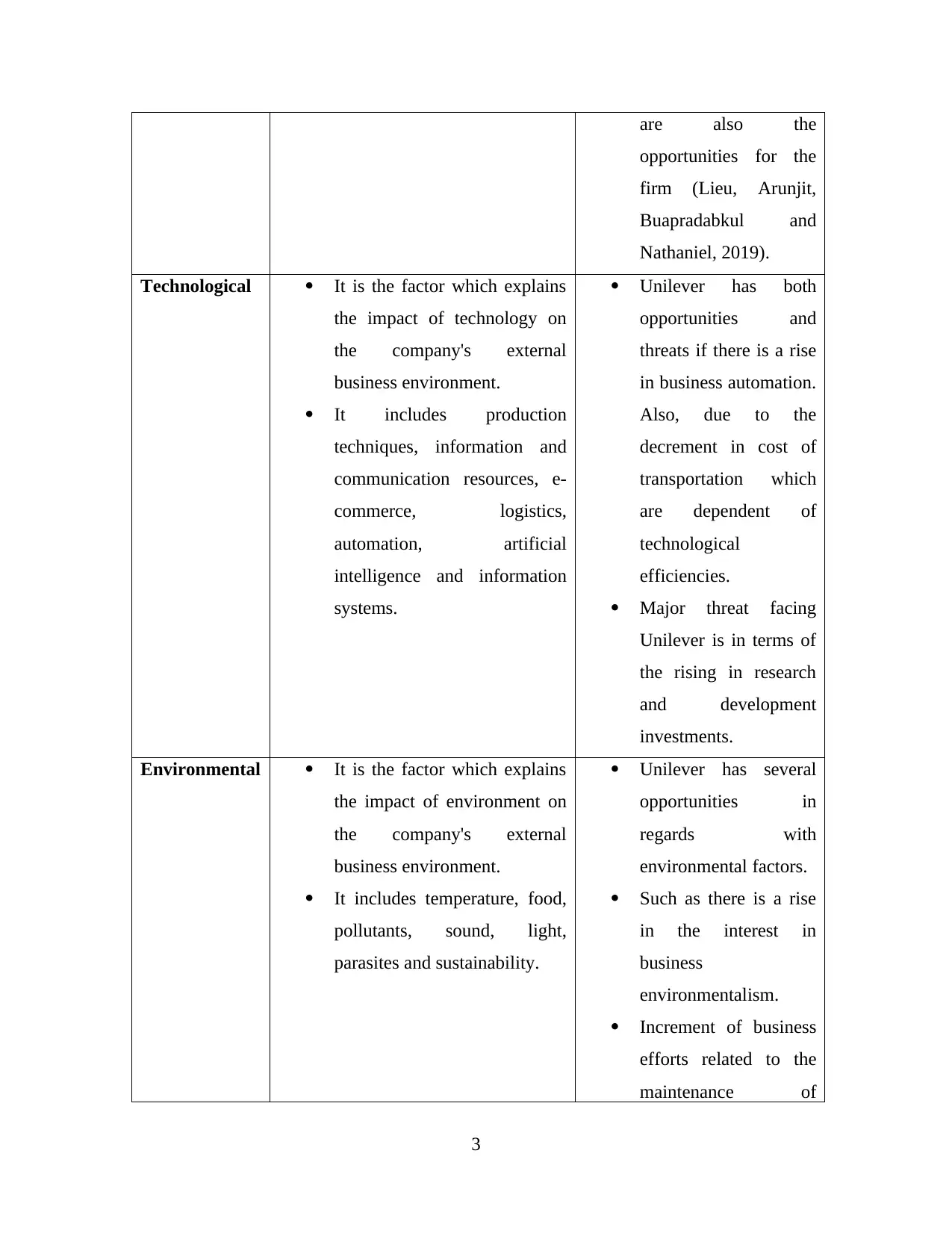
are also the
opportunities for the
firm (Lieu, Arunjit,
Buapradabkul and
Nathaniel, 2019).
Technological It is the factor which explains
the impact of technology on
the company's external
business environment.
It includes production
techniques, information and
communication resources, e-
commerce, logistics,
automation, artificial
intelligence and information
systems.
Unilever has both
opportunities and
threats if there is a rise
in business automation.
Also, due to the
decrement in cost of
transportation which
are dependent of
technological
efficiencies.
Major threat facing
Unilever is in terms of
the rising in research
and development
investments.
Environmental It is the factor which explains
the impact of environment on
the company's external
business environment.
It includes temperature, food,
pollutants, sound, light,
parasites and sustainability.
Unilever has several
opportunities in
regards with
environmental factors.
Such as there is a rise
in the interest in
business
environmentalism.
Increment of business
efforts related to the
maintenance of
3
opportunities for the
firm (Lieu, Arunjit,
Buapradabkul and
Nathaniel, 2019).
Technological It is the factor which explains
the impact of technology on
the company's external
business environment.
It includes production
techniques, information and
communication resources, e-
commerce, logistics,
automation, artificial
intelligence and information
systems.
Unilever has both
opportunities and
threats if there is a rise
in business automation.
Also, due to the
decrement in cost of
transportation which
are dependent of
technological
efficiencies.
Major threat facing
Unilever is in terms of
the rising in research
and development
investments.
Environmental It is the factor which explains
the impact of environment on
the company's external
business environment.
It includes temperature, food,
pollutants, sound, light,
parasites and sustainability.
Unilever has several
opportunities in
regards with
environmental factors.
Such as there is a rise
in the interest in
business
environmentalism.
Increment of business
efforts related to the
maintenance of
3
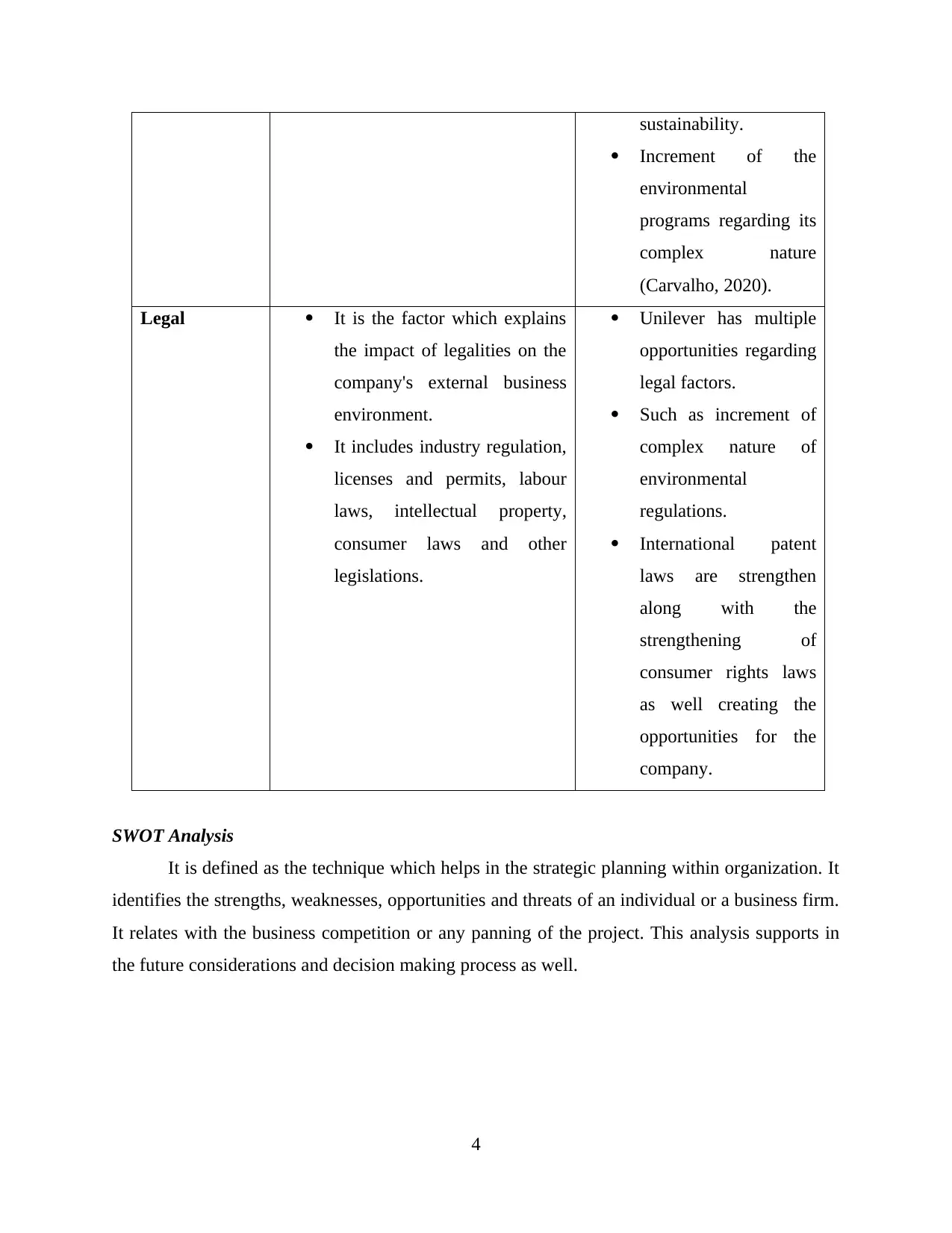
sustainability.
Increment of the
environmental
programs regarding its
complex nature
(Carvalho, 2020).
Legal It is the factor which explains
the impact of legalities on the
company's external business
environment.
It includes industry regulation,
licenses and permits, labour
laws, intellectual property,
consumer laws and other
legislations.
Unilever has multiple
opportunities regarding
legal factors.
Such as increment of
complex nature of
environmental
regulations.
International patent
laws are strengthen
along with the
strengthening of
consumer rights laws
as well creating the
opportunities for the
company.
SWOT Analysis
It is defined as the technique which helps in the strategic planning within organization. It
identifies the strengths, weaknesses, opportunities and threats of an individual or a business firm.
It relates with the business competition or any panning of the project. This analysis supports in
the future considerations and decision making process as well.
4
Increment of the
environmental
programs regarding its
complex nature
(Carvalho, 2020).
Legal It is the factor which explains
the impact of legalities on the
company's external business
environment.
It includes industry regulation,
licenses and permits, labour
laws, intellectual property,
consumer laws and other
legislations.
Unilever has multiple
opportunities regarding
legal factors.
Such as increment of
complex nature of
environmental
regulations.
International patent
laws are strengthen
along with the
strengthening of
consumer rights laws
as well creating the
opportunities for the
company.
SWOT Analysis
It is defined as the technique which helps in the strategic planning within organization. It
identifies the strengths, weaknesses, opportunities and threats of an individual or a business firm.
It relates with the business competition or any panning of the project. This analysis supports in
the future considerations and decision making process as well.
4
⊘ This is a preview!⊘
Do you want full access?
Subscribe today to unlock all pages.

Trusted by 1+ million students worldwide
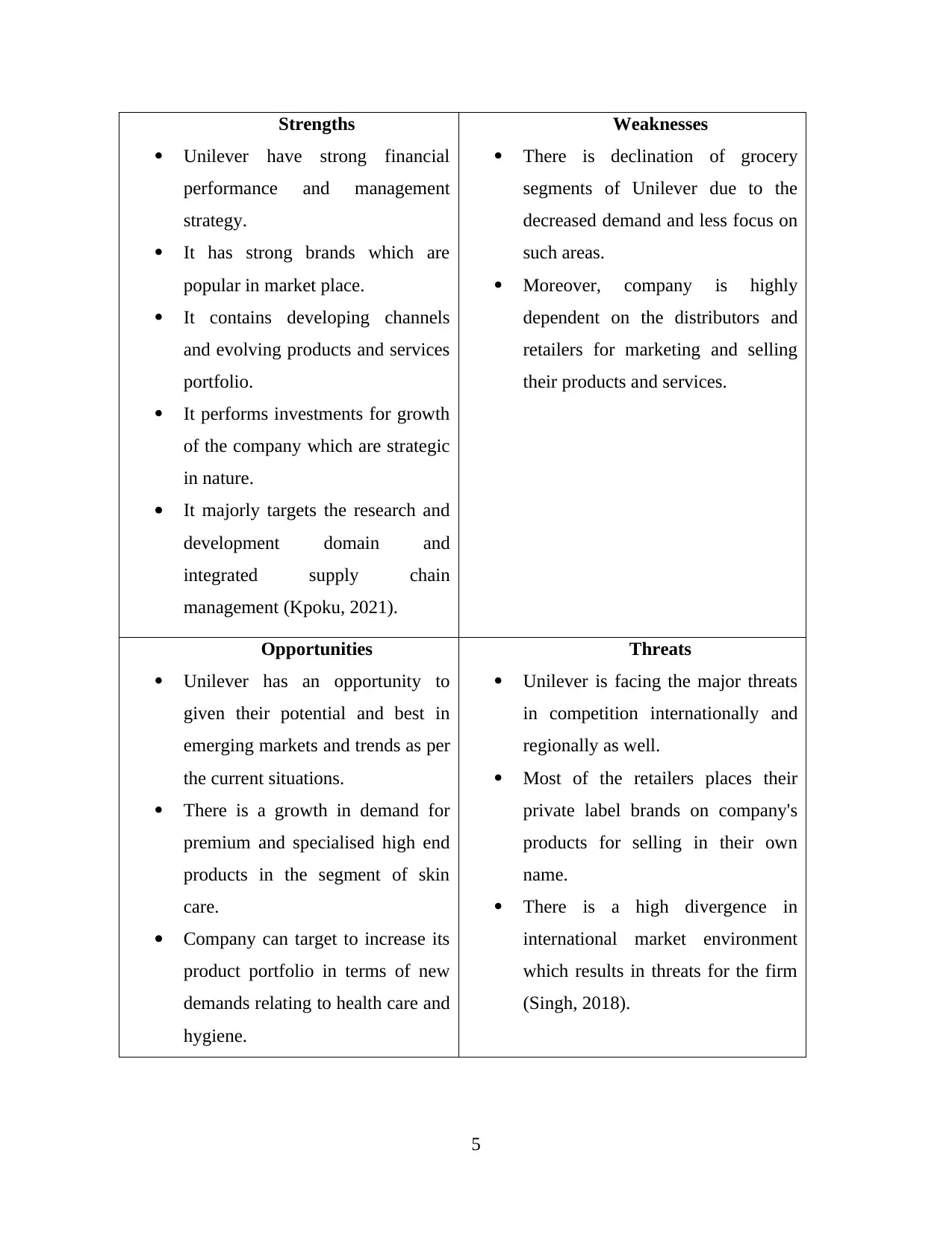
Strengths
Unilever have strong financial
performance and management
strategy.
It has strong brands which are
popular in market place.
It contains developing channels
and evolving products and services
portfolio.
It performs investments for growth
of the company which are strategic
in nature.
It majorly targets the research and
development domain and
integrated supply chain
management (Kpoku, 2021).
Weaknesses
There is declination of grocery
segments of Unilever due to the
decreased demand and less focus on
such areas.
Moreover, company is highly
dependent on the distributors and
retailers for marketing and selling
their products and services.
Opportunities
Unilever has an opportunity to
given their potential and best in
emerging markets and trends as per
the current situations.
There is a growth in demand for
premium and specialised high end
products in the segment of skin
care.
Company can target to increase its
product portfolio in terms of new
demands relating to health care and
hygiene.
Threats
Unilever is facing the major threats
in competition internationally and
regionally as well.
Most of the retailers places their
private label brands on company's
products for selling in their own
name.
There is a high divergence in
international market environment
which results in threats for the firm
(Singh, 2018).
5
Unilever have strong financial
performance and management
strategy.
It has strong brands which are
popular in market place.
It contains developing channels
and evolving products and services
portfolio.
It performs investments for growth
of the company which are strategic
in nature.
It majorly targets the research and
development domain and
integrated supply chain
management (Kpoku, 2021).
Weaknesses
There is declination of grocery
segments of Unilever due to the
decreased demand and less focus on
such areas.
Moreover, company is highly
dependent on the distributors and
retailers for marketing and selling
their products and services.
Opportunities
Unilever has an opportunity to
given their potential and best in
emerging markets and trends as per
the current situations.
There is a growth in demand for
premium and specialised high end
products in the segment of skin
care.
Company can target to increase its
product portfolio in terms of new
demands relating to health care and
hygiene.
Threats
Unilever is facing the major threats
in competition internationally and
regionally as well.
Most of the retailers places their
private label brands on company's
products for selling in their own
name.
There is a high divergence in
international market environment
which results in threats for the firm
(Singh, 2018).
5
Paraphrase This Document
Need a fresh take? Get an instant paraphrase of this document with our AI Paraphraser
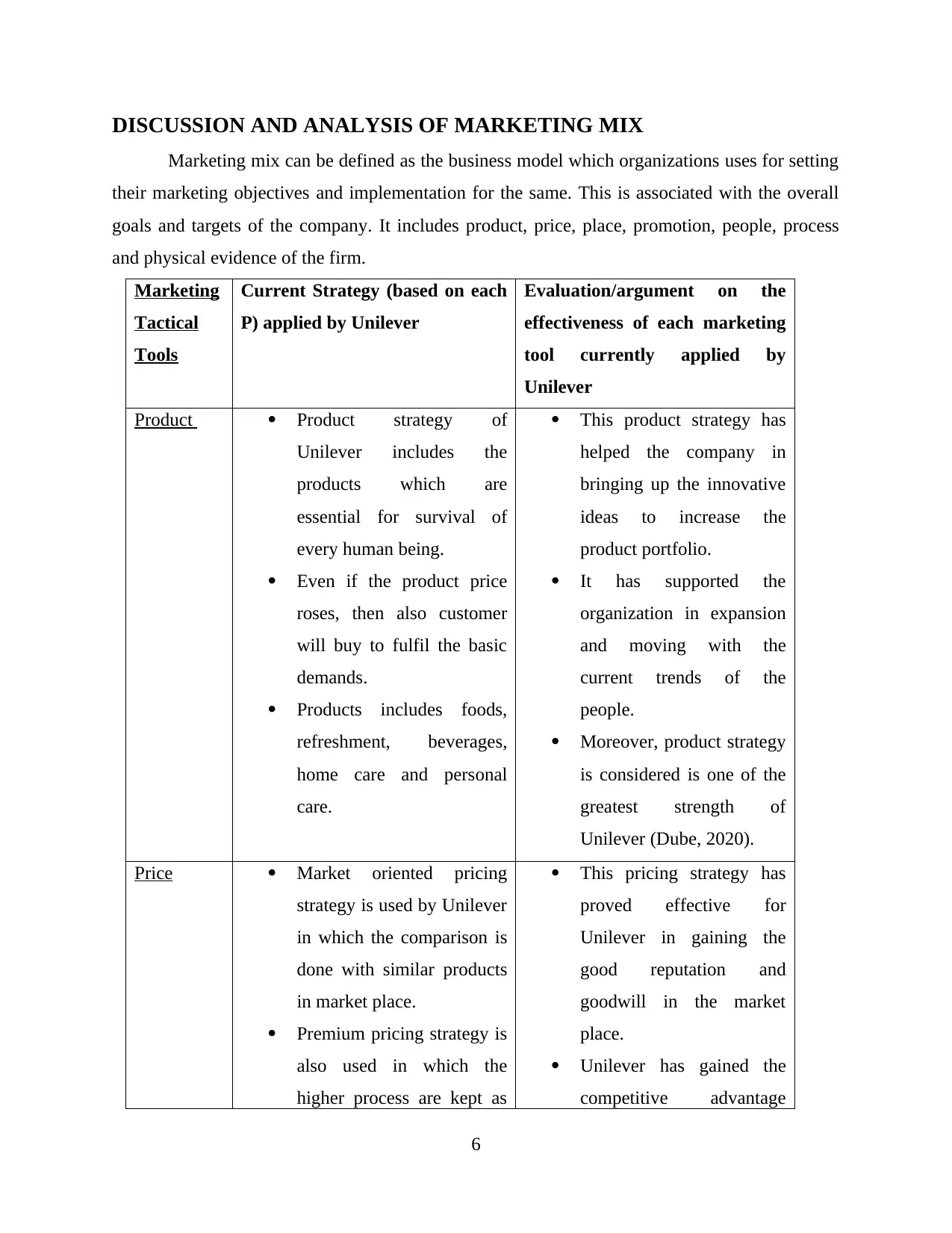
DISCUSSION AND ANALYSIS OF MARKETING MIX
Marketing mix can be defined as the business model which organizations uses for setting
their marketing objectives and implementation for the same. This is associated with the overall
goals and targets of the company. It includes product, price, place, promotion, people, process
and physical evidence of the firm.
Marketing
Tactical
Tools
Current Strategy (based on each
P) applied by Unilever
Evaluation/argument on the
effectiveness of each marketing
tool currently applied by
Unilever
Product Product strategy of
Unilever includes the
products which are
essential for survival of
every human being.
Even if the product price
roses, then also customer
will buy to fulfil the basic
demands.
Products includes foods,
refreshment, beverages,
home care and personal
care.
This product strategy has
helped the company in
bringing up the innovative
ideas to increase the
product portfolio.
It has supported the
organization in expansion
and moving with the
current trends of the
people.
Moreover, product strategy
is considered is one of the
greatest strength of
Unilever (Dube, 2020).
Price Market oriented pricing
strategy is used by Unilever
in which the comparison is
done with similar products
in market place.
Premium pricing strategy is
also used in which the
higher process are kept as
This pricing strategy has
proved effective for
Unilever in gaining the
good reputation and
goodwill in the market
place.
Unilever has gained the
competitive advantage
6
Marketing mix can be defined as the business model which organizations uses for setting
their marketing objectives and implementation for the same. This is associated with the overall
goals and targets of the company. It includes product, price, place, promotion, people, process
and physical evidence of the firm.
Marketing
Tactical
Tools
Current Strategy (based on each
P) applied by Unilever
Evaluation/argument on the
effectiveness of each marketing
tool currently applied by
Unilever
Product Product strategy of
Unilever includes the
products which are
essential for survival of
every human being.
Even if the product price
roses, then also customer
will buy to fulfil the basic
demands.
Products includes foods,
refreshment, beverages,
home care and personal
care.
This product strategy has
helped the company in
bringing up the innovative
ideas to increase the
product portfolio.
It has supported the
organization in expansion
and moving with the
current trends of the
people.
Moreover, product strategy
is considered is one of the
greatest strength of
Unilever (Dube, 2020).
Price Market oriented pricing
strategy is used by Unilever
in which the comparison is
done with similar products
in market place.
Premium pricing strategy is
also used in which the
higher process are kept as
This pricing strategy has
proved effective for
Unilever in gaining the
good reputation and
goodwill in the market
place.
Unilever has gained the
competitive advantage
6
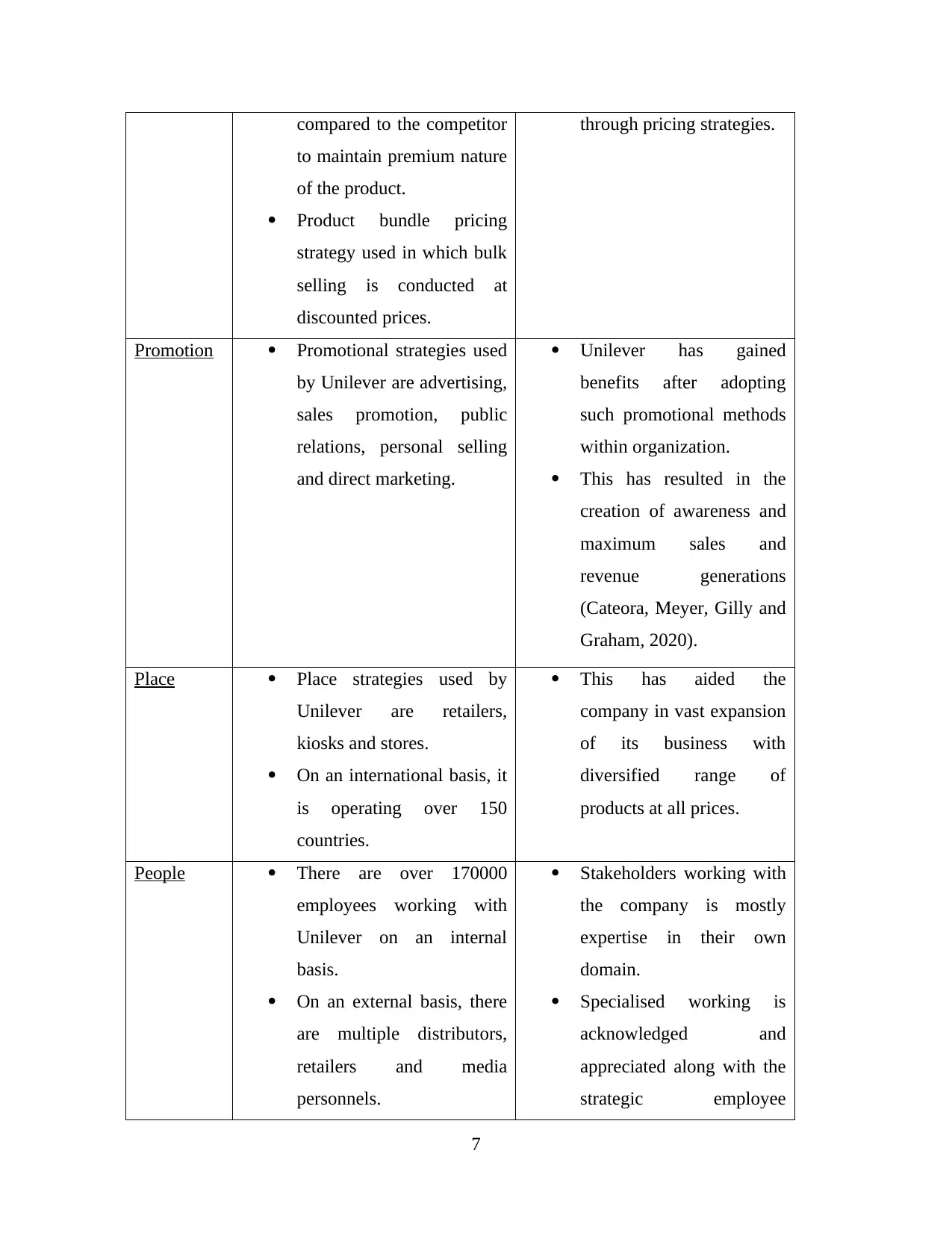
compared to the competitor
to maintain premium nature
of the product.
Product bundle pricing
strategy used in which bulk
selling is conducted at
discounted prices.
through pricing strategies.
Promotion Promotional strategies used
by Unilever are advertising,
sales promotion, public
relations, personal selling
and direct marketing.
Unilever has gained
benefits after adopting
such promotional methods
within organization.
This has resulted in the
creation of awareness and
maximum sales and
revenue generations
(Cateora, Meyer, Gilly and
Graham, 2020).
Place Place strategies used by
Unilever are retailers,
kiosks and stores.
On an international basis, it
is operating over 150
countries.
This has aided the
company in vast expansion
of its business with
diversified range of
products at all prices.
People There are over 170000
employees working with
Unilever on an internal
basis.
On an external basis, there
are multiple distributors,
retailers and media
personnels.
Stakeholders working with
the company is mostly
expertise in their own
domain.
Specialised working is
acknowledged and
appreciated along with the
strategic employee
7
to maintain premium nature
of the product.
Product bundle pricing
strategy used in which bulk
selling is conducted at
discounted prices.
through pricing strategies.
Promotion Promotional strategies used
by Unilever are advertising,
sales promotion, public
relations, personal selling
and direct marketing.
Unilever has gained
benefits after adopting
such promotional methods
within organization.
This has resulted in the
creation of awareness and
maximum sales and
revenue generations
(Cateora, Meyer, Gilly and
Graham, 2020).
Place Place strategies used by
Unilever are retailers,
kiosks and stores.
On an international basis, it
is operating over 150
countries.
This has aided the
company in vast expansion
of its business with
diversified range of
products at all prices.
People There are over 170000
employees working with
Unilever on an internal
basis.
On an external basis, there
are multiple distributors,
retailers and media
personnels.
Stakeholders working with
the company is mostly
expertise in their own
domain.
Specialised working is
acknowledged and
appreciated along with the
strategic employee
7
⊘ This is a preview!⊘
Do you want full access?
Subscribe today to unlock all pages.

Trusted by 1+ million students worldwide
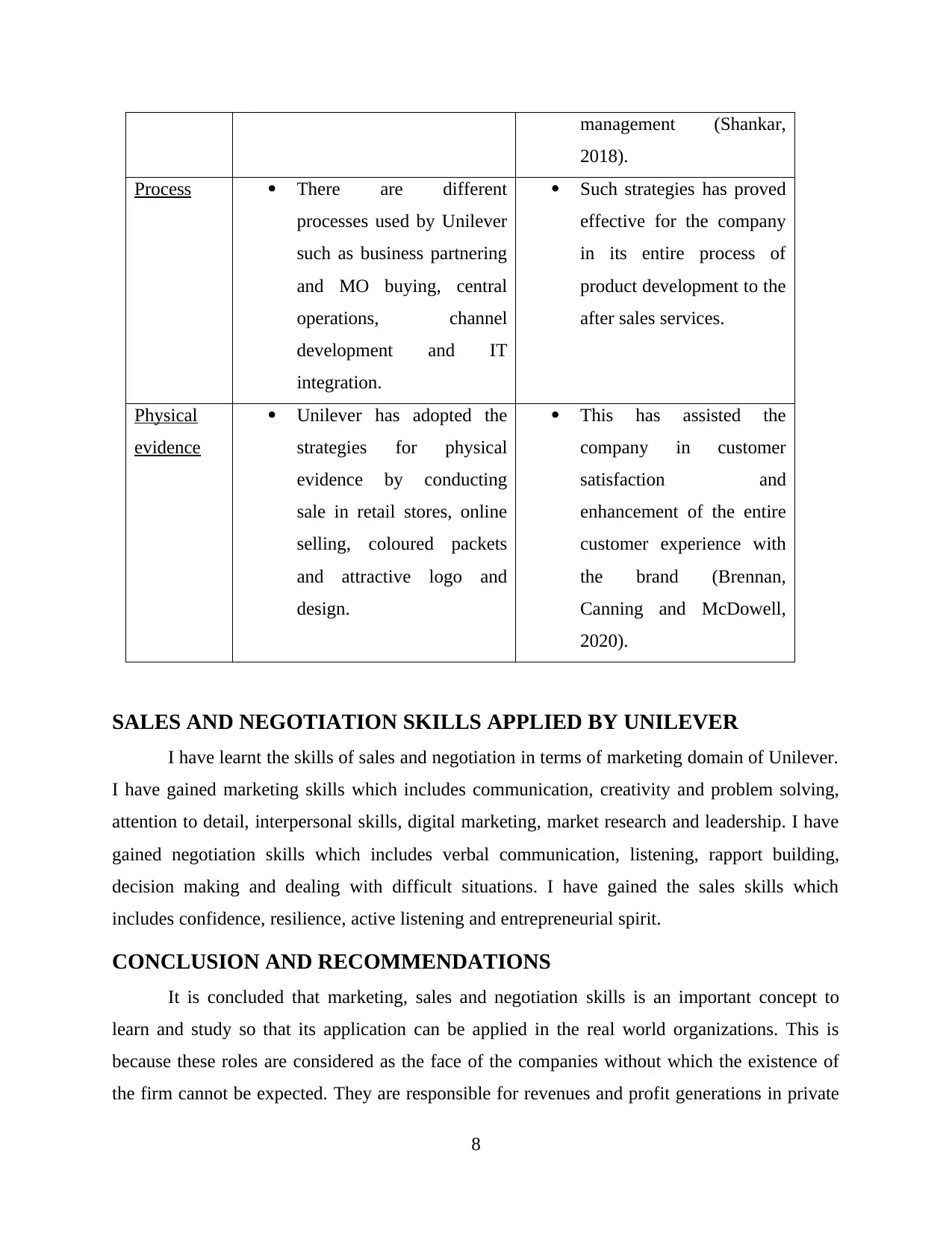
management (Shankar,
2018).
Process There are different
processes used by Unilever
such as business partnering
and MO buying, central
operations, channel
development and IT
integration.
Such strategies has proved
effective for the company
in its entire process of
product development to the
after sales services.
Physical
evidence
Unilever has adopted the
strategies for physical
evidence by conducting
sale in retail stores, online
selling, coloured packets
and attractive logo and
design.
This has assisted the
company in customer
satisfaction and
enhancement of the entire
customer experience with
the brand (Brennan,
Canning and McDowell,
2020).
SALES AND NEGOTIATION SKILLS APPLIED BY UNILEVER
I have learnt the skills of sales and negotiation in terms of marketing domain of Unilever.
I have gained marketing skills which includes communication, creativity and problem solving,
attention to detail, interpersonal skills, digital marketing, market research and leadership. I have
gained negotiation skills which includes verbal communication, listening, rapport building,
decision making and dealing with difficult situations. I have gained the sales skills which
includes confidence, resilience, active listening and entrepreneurial spirit.
CONCLUSION AND RECOMMENDATIONS
It is concluded that marketing, sales and negotiation skills is an important concept to
learn and study so that its application can be applied in the real world organizations. This is
because these roles are considered as the face of the companies without which the existence of
the firm cannot be expected. They are responsible for revenues and profit generations in private
8
2018).
Process There are different
processes used by Unilever
such as business partnering
and MO buying, central
operations, channel
development and IT
integration.
Such strategies has proved
effective for the company
in its entire process of
product development to the
after sales services.
Physical
evidence
Unilever has adopted the
strategies for physical
evidence by conducting
sale in retail stores, online
selling, coloured packets
and attractive logo and
design.
This has assisted the
company in customer
satisfaction and
enhancement of the entire
customer experience with
the brand (Brennan,
Canning and McDowell,
2020).
SALES AND NEGOTIATION SKILLS APPLIED BY UNILEVER
I have learnt the skills of sales and negotiation in terms of marketing domain of Unilever.
I have gained marketing skills which includes communication, creativity and problem solving,
attention to detail, interpersonal skills, digital marketing, market research and leadership. I have
gained negotiation skills which includes verbal communication, listening, rapport building,
decision making and dealing with difficult situations. I have gained the sales skills which
includes confidence, resilience, active listening and entrepreneurial spirit.
CONCLUSION AND RECOMMENDATIONS
It is concluded that marketing, sales and negotiation skills is an important concept to
learn and study so that its application can be applied in the real world organizations. This is
because these roles are considered as the face of the companies without which the existence of
the firm cannot be expected. They are responsible for revenues and profit generations in private
8
Paraphrase This Document
Need a fresh take? Get an instant paraphrase of this document with our AI Paraphraser
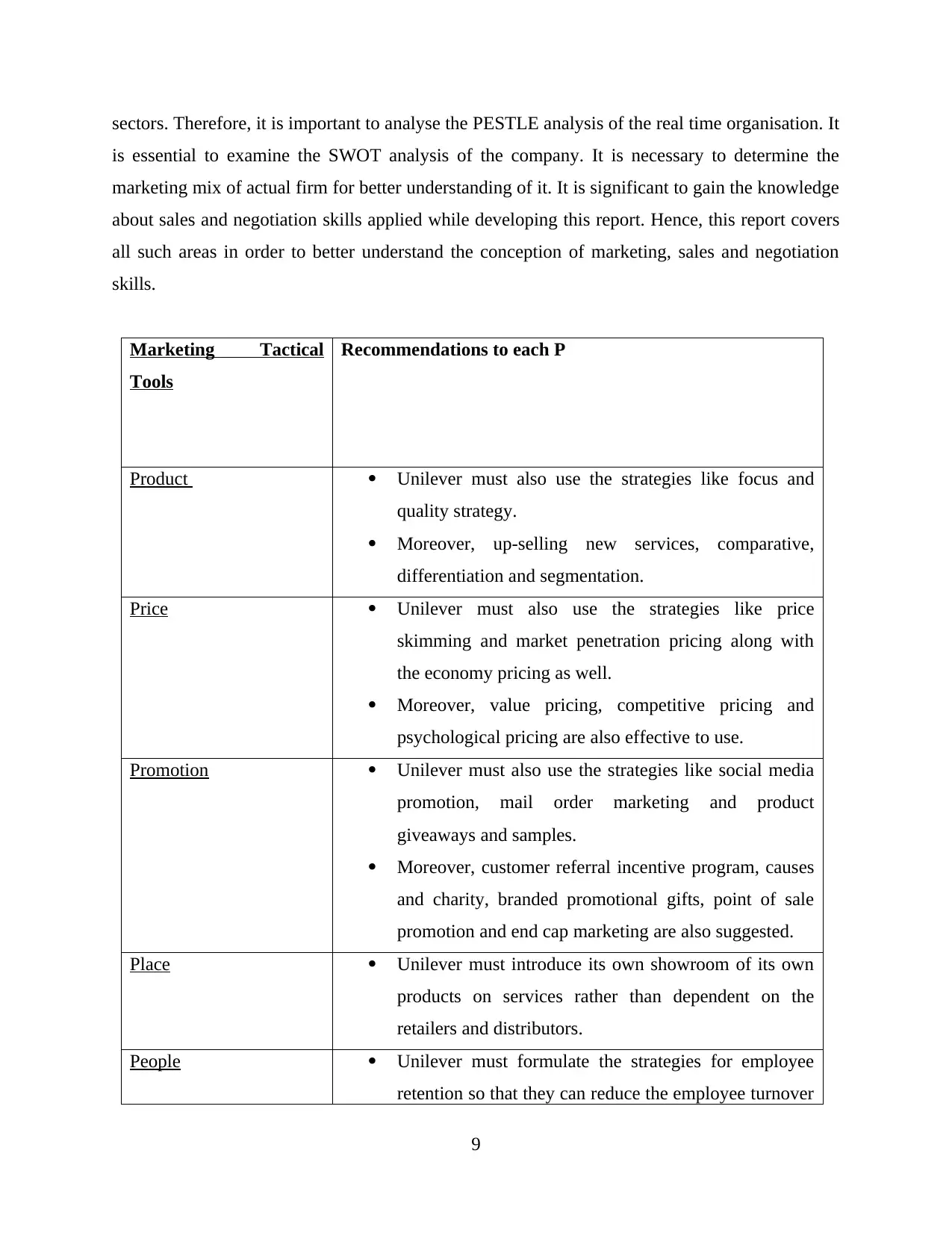
sectors. Therefore, it is important to analyse the PESTLE analysis of the real time organisation. It
is essential to examine the SWOT analysis of the company. It is necessary to determine the
marketing mix of actual firm for better understanding of it. It is significant to gain the knowledge
about sales and negotiation skills applied while developing this report. Hence, this report covers
all such areas in order to better understand the conception of marketing, sales and negotiation
skills.
Marketing Tactical
Tools
Recommendations to each P
Product Unilever must also use the strategies like focus and
quality strategy.
Moreover, up-selling new services, comparative,
differentiation and segmentation.
Price Unilever must also use the strategies like price
skimming and market penetration pricing along with
the economy pricing as well.
Moreover, value pricing, competitive pricing and
psychological pricing are also effective to use.
Promotion Unilever must also use the strategies like social media
promotion, mail order marketing and product
giveaways and samples.
Moreover, customer referral incentive program, causes
and charity, branded promotional gifts, point of sale
promotion and end cap marketing are also suggested.
Place Unilever must introduce its own showroom of its own
products on services rather than dependent on the
retailers and distributors.
People Unilever must formulate the strategies for employee
retention so that they can reduce the employee turnover
9
is essential to examine the SWOT analysis of the company. It is necessary to determine the
marketing mix of actual firm for better understanding of it. It is significant to gain the knowledge
about sales and negotiation skills applied while developing this report. Hence, this report covers
all such areas in order to better understand the conception of marketing, sales and negotiation
skills.
Marketing Tactical
Tools
Recommendations to each P
Product Unilever must also use the strategies like focus and
quality strategy.
Moreover, up-selling new services, comparative,
differentiation and segmentation.
Price Unilever must also use the strategies like price
skimming and market penetration pricing along with
the economy pricing as well.
Moreover, value pricing, competitive pricing and
psychological pricing are also effective to use.
Promotion Unilever must also use the strategies like social media
promotion, mail order marketing and product
giveaways and samples.
Moreover, customer referral incentive program, causes
and charity, branded promotional gifts, point of sale
promotion and end cap marketing are also suggested.
Place Unilever must introduce its own showroom of its own
products on services rather than dependent on the
retailers and distributors.
People Unilever must formulate the strategies for employee
retention so that they can reduce the employee turnover
9
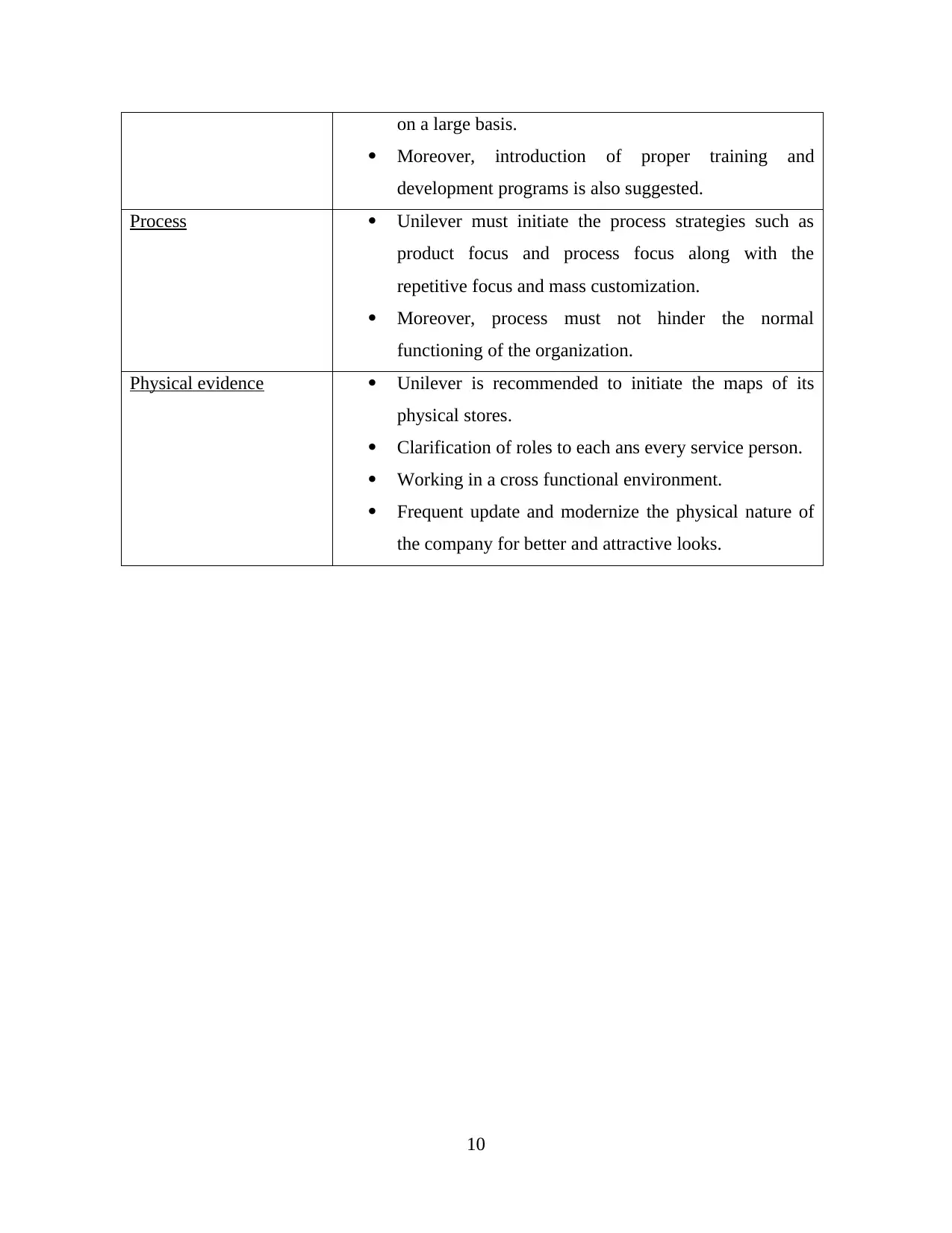
on a large basis.
Moreover, introduction of proper training and
development programs is also suggested.
Process Unilever must initiate the process strategies such as
product focus and process focus along with the
repetitive focus and mass customization.
Moreover, process must not hinder the normal
functioning of the organization.
Physical evidence Unilever is recommended to initiate the maps of its
physical stores.
Clarification of roles to each ans every service person.
Working in a cross functional environment.
Frequent update and modernize the physical nature of
the company for better and attractive looks.
10
Moreover, introduction of proper training and
development programs is also suggested.
Process Unilever must initiate the process strategies such as
product focus and process focus along with the
repetitive focus and mass customization.
Moreover, process must not hinder the normal
functioning of the organization.
Physical evidence Unilever is recommended to initiate the maps of its
physical stores.
Clarification of roles to each ans every service person.
Working in a cross functional environment.
Frequent update and modernize the physical nature of
the company for better and attractive looks.
10
⊘ This is a preview!⊘
Do you want full access?
Subscribe today to unlock all pages.

Trusted by 1+ million students worldwide
1 out of 13
Related Documents
Your All-in-One AI-Powered Toolkit for Academic Success.
+13062052269
info@desklib.com
Available 24*7 on WhatsApp / Email
![[object Object]](/_next/static/media/star-bottom.7253800d.svg)
Unlock your academic potential
Copyright © 2020–2026 A2Z Services. All Rights Reserved. Developed and managed by ZUCOL.





